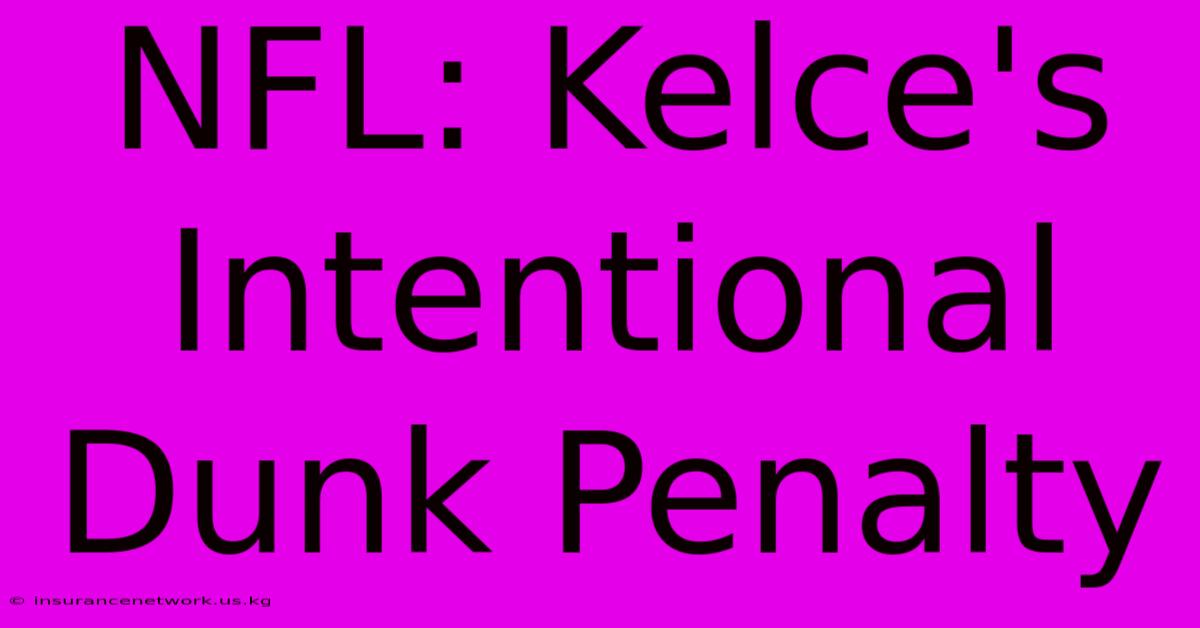NFL: Kelce's Intentional Dunk Penalty

Discover more detailed and exciting information on our website. Click the link below to start your adventure: Visit Best Website insurancenetwork.us.kg. Don't miss out!
Table of Contents
NFL: Kelce's Intentional Dunk Penalty – A Controversial Call
Travis Kelce's infamous "dunk" celebration during the AFC Championship game sparked a fiery debate about sportsmanship, penalties, and the evolving nature of NFL celebrations. This seemingly innocuous act resulted in a 15-yard unsportsmanlike conduct penalty, impacting the Kansas City Chiefs' drive and igniting a discussion that extends far beyond just one game. Let's delve into the controversy surrounding Kelce's penalty.
Understanding the Penalty: Unnecessary Roughness vs. Unsportsmanlike Conduct
The referee's call was for unsportsmanlike conduct, not unnecessary roughness. This distinction is crucial. Unnecessary roughness implies physical contact that endangers an opponent. Unsportsmanlike conduct, on the other hand, encompasses actions deemed excessive or inappropriate, regardless of physical contact. Kelce's dunk, while not physically harming anyone, was interpreted by the officiating crew as an excessive display of celebration, violating the league's rules on unsportsmanlike conduct.
The Rulebook and the Gray Area
The NFL rulebook doesn't explicitly outlaw dunking the football. The problem lies in the interpretation of what constitutes "excessive celebration." The league aims to balance exciting player displays with maintaining sportsmanship and preventing excessive taunting. Kelce's celebration, while arguably thrilling for fans, clearly crossed the line for the officials on the field that day. The subjective nature of this rule leaves room for inconsistencies in officiating across games.
The Aftermath: Public Reaction and League Response
The penalty ignited a firestorm of debate on social media and sports talk shows. Fans, analysts, and former players weighed in, with opinions sharply divided. Some argued the penalty was overly harsh and stifles player expression, while others defended the call, emphasizing the need for maintaining order and decorum. The NFL hasn't explicitly commented on the specificity of the call, but the overall discussion highlights the ongoing challenge of balancing player enthusiasm with maintaining game integrity.
Impact on the Game and Future Implications
While the Chiefs ultimately won the game, the penalty undeniably impacted their drive and put them in a slightly more difficult position. This incident raises questions about the consistency of officiating and the need for clearer guidelines regarding acceptable celebrations. Will the NFL re-evaluate its rules on celebrations in light of this highly-publicized event? Only time will tell.
Comparing Kelce's Dunk to Other Celebrations
Kelce's dunk wasn't the first controversial celebration in NFL history, and it certainly won't be the last. Comparing it to other penalty-inducing celebrations can provide context. Were similar acts penalized in the past? What were the circumstances? Analyzing similar instances can illuminate the inconsistent application of the rules surrounding celebrations and the need for greater clarity.
Key Considerations:
- Context of the game: Was the game close? Was the celebration directed at an opponent? These factors influence the perceived intent and severity of the act.
- Player history: Does the player have a history of unsportsmanlike conduct? Repeat offenders might face stricter penalties.
- Referee discretion: Ultimately, the referee's judgment plays a significant role in determining whether a celebration is penalized.
Conclusion: A Call for Consistency and Clarity
Kelce's intentional dunk penalty highlights the ongoing tension between player expression and league regulations. The incident underscores the need for greater consistency in officiating and potentially clearer guidelines regarding what constitutes "excessive celebration." The lack of a precise definition opens the door to subjective interpretations, leading to inconsistencies and controversies like this one. Moving forward, a more transparent and clearly defined set of rules around player celebrations would benefit both players and fans. The NFL must find a better balance to ensure exciting gameplay without stifling player emotion and expression.

Thank you for visiting our website wich cover about NFL: Kelce's Intentional Dunk Penalty. We hope the information provided has been useful to you. Feel free to contact us if you have any questions or need further assistance. See you next time and dont miss to bookmark.
Featured Posts
-
Fact Checking The Bob Dylan Film A Complete Unknown
Dec 26, 2024
-
Live Chanukah Menorah Lighting Tampa
Dec 26, 2024
-
Starbucks Baristas End Five Day Strike
Dec 26, 2024
-
A Complete Unknown Dylans Critics Weigh In
Dec 26, 2024
-
Kelces Nfl Christmas Netflix Special
Dec 26, 2024
